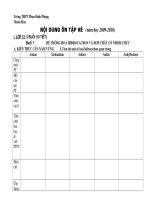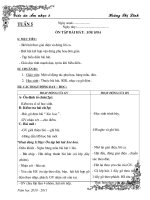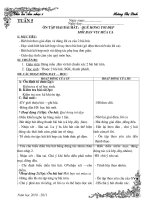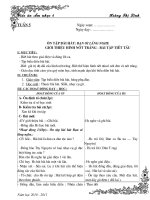GIAO AN CT CHUAN- UNIT4 lop 12
Bạn đang xem bản rút gọn của tài liệu. Xem và tải ngay bản đầy đủ của tài liệu tại đây (101.39 KB, 9 trang )
Unit 4 : SCHOOL EDUCATION SYSTEM
The 19
th
period
Unit 4: Reading
A. Objectives:
- Students should know school education system in England
- General knowledge: Students know about school education system
- Language: Sentences and expression for describing school education system
- New words: Words related to school education system
- Guessing meaning in context, scanning for specific information and passage
comprehension
B. Method: Integrated, mainly communicative
C. Teaching aids: Board, tape, cassetteplayer, chalks, textbook and notebook
D. Procedure:
Teacher’s activities Students’ activities
I.Warm-up: (5 minutes)
- Ask Ss some questions about the picture:
- Who are they?
- What are they doing?
- Do you think they are English students?
II. Presentation ( 35 min )
1. Pre - reading:
- Ask students to read the facts below and decide
whether the statements about schools in Vietnam
are true (T) or false (F). Then compare their
results with their partners’.
Facts about schools
1. Children start Grade 1 when they are 6 years
old.
2. Schooling is compulsory from the age of 6 to
16.
3. The school year generally begins in September
and ends in late May.
4. The students do not have any examinations
when they finish secondary school.
5. A school year consists of two terms.
2.While - reading :
- Ask students to look through the passage and
read in silence
- Help students read the passage
- Explain pronunciation and meaning of new words
which appear in the passage
* Task 1 : Find words or phrases in the reading
passage which have the following meanings.- Let
students work individual or in groups
- Help students if necessary
Keys:
1- state schools
- Open the book
- Listen to the teacher
- Answer the questions
- Listen to the teacher and open the book – Unit
1, part A: reading
- Look at the book, listen to the teacher and work in
pairs to decide whether the statements about
schools in Vietnam are true (T) or false (F). Then
compare their results with their partners’.
1. T
2. F
3. T
4. F
5. T
- Listen to the teacher then read the passages
- Ask some new words if necessary
- Keep the book open
- Listen to the teacher then do task 1
- Ask the teacher if necessary
- work individual or in group
- Write down in the notebook
2- primary education
3- secondary education
4- compulsory
5- General Certificate of Secondary
Education (GCSE)
6- Curriculum
* Task 2:
- Ask students to answer the following questions
- Ask students look through the passages then try
to answer the questions in right way
- Let them work in pairs
- Help students if necessary
(the answers in the passage)
Walk round the classroom and correct mistakes
3. Post- reading:
Ask Ss to work in groups. Tell the others one of
the most difficult school subjects you are
studying and what you would like your friends
and your teacher to do to help you learn that
subject more effectively.
III. Consolidation & Home work: (5 minutes)
- Ask students to do Reading exercise of Unit 1
in workbook and prepare Part B : Speaking at
home
- Listen to the teacher
- Try to answer the questions
- Practice with a partner then write them down in
the note books
- Ask the teacher if necessary
- Listen to the teacher and make a brief note about
school education system in England
- Listen to the teacher
- Try to talk about school education system in
England
- The students who are called to stand up to talk
loudly are intelligent ones
Keys:
1. from the age of 5
2. 3 terms
3. the state school and the independent or‘ ’
public school systems‘ ’
4. yes
5. There are 3 core subjects (English, Maths and
Science)
6. When Ss finish the secondary school, they can
take an examination called the General
Certificate of Secondary Education
- Listen to the teacher and write down
homework
Good bye !
The 20
th
Period
Unit 4: Speaking
A. Objectives:
- Students should know school education system in Vietnam
- General knowledge: Students learn about school education system
- Language: Talking about the school education system in Vietnam.
- New words: words related to school education system
- Talking about school education system
B. Method: integrated, mainly communicative
C. Teaching aids: Board, chalks, textbook and notebook....
D. Procedure:
Teacher’s activities Students’ activities
I. Warm-up: (5 minutes)
- Ask students to keep book close
- Write on the board names of school
education system in Vietnam: University,
nursery, primary school, college,
kindergarten, secondary school. Then ask Ss
to put them in order
- Ask students to repeat
Tell Ss to understand more about school
education system in Vietnam.
(We learn Unit 1, part- speaking)
II. Presentation ( 35 min )
1. Pre-speaking :
* Task 1
- Ask Ss to work in pairs. Study the table
below then ask and answer the questions
about the school education system in
Vietnam.
- Let them work in pairs
- Listen to students and correct mistakes
Example:
A: When do the children in Vietnam go to
primary school?
B: When they are 6 years old.
A: How long does the primary education
last?
B: 5 years.
2. While-speaking :
* Task 2
- Teacher introduces the task “Work in
groups. Talk about the school education
system in Vietnam, using the information
from Task 1”.
- Guide students how to practise.
- Ask students to work in pairs.
- Help the students with new structures.
- Walk around and help them.
- Call some student to stand up and report
before the class.
- Correct their mistakes
3. Post-speaking :
* Task 3
-Teacher introduces the task “Work in
groups. Talk about the similarities and
differences between the school system in
Vietnam and in England”.
- Let them work in groups
- Keep books close
- Listen to the teacher
- Look at the board and try to remember names of ten
subjects
- Work in pairs.
- Practice asking and answering the questions about
the school education system in Vietnam using the
information in the table.
Example:
A: When do the children in Vietnam go to primary
school?
B: When they are 6 years old.
A: How long does the primary education last?
B: 5 years.
- Listen to the teacher
- Do task 2
- Work in groups
- The students are called stand up and tell loudly
Example:
In Vietnam, children can go to Nursery school when
they are 1 to 2 and go to Kindergarten when they are
from 2 to 5
- Work in groups. Talk about the similarities and
differences between the school system in Vietnam and
in England
Example:
There are some differences between the school
systems in Vietnam an England. Children in Vietnam
start primary school at the age of 6 and finis this level
- Ask some students to stand up and tell
loudly
- Walk round and help them
- Listen and correct mistakes
III.Consolidation & Homework: (5
minutes)
- Ask students to write a passage about
similarities and differences between the
school system in Vietnam and in England
- Ask students to prepare Part C- Listening
and do homework
at 10 while those in England study at primary school
from the age of 5 to 10. Schooling is compulsory for
Vietnamese children until the age of 1 but, in
England, compulsory education ends when children
are 16. There is also a difference about the subjects
studied at schools.
On the other hand, Vietnam and England school
systems have some similarities. Students in both
countries have to follow the national curriculum set by
the government. After finishing secondary schools
they all have to take the national examination known
as GCSE
- Listen to the teacher
- Write down the homework
Good bye !
The 21
st
Period
Unit 4 Listening
A. Objectives:
- Students should know about someone’s background.
- General knowledge: Students talk about someone’s background.
- Language
- New words: Words related to someone’s education.
- Listening for gist and for specific information
B. Method: Integrated, mainly communicative
C. Teaching aids: Board, tape, cassetteplayer, chalks, textbook and notebook
D. Procedures:
Teacher’s activities Students’ activities
I. Warm-up: (5 minutes)
- Ask Ss some questions about their studies at
school.
1. What school subjects are you good at?
2. Which ones do you enjoy most/least in
your class? Explain why.
II. Presentation ( 35 min )
1. Pre-listening:
- Ask Ss to look at “Listen and repeat”
- Read and ask students to listen
- Let students listen again and repeat.
- Write some words on board and ask students
to read them aloud.
- Let they work in pairs
- Listen and correct mistakes
- Listen to the teacher
- Answer the questions:
- Work in pairs
- Listen and understand the meanings of those
words.
2.While-listening:
* Task 1:
- Ask students to read the questions quickly.
- Guide students the requests of the task.
- Let students listen twice.
- Write on board from 1 to 6 and call some
students to come and write their answers.
- Let them listen again and correct.
* Task 2:
- Teacher introduces the task “Listen again
and answer the questions”.
1. When did Gavin think he listed to the
teacher well?
2. How did Gavin find the exams?
3. Why couldn’t Gavin pass the exams easily?
4. Why did Gavin say he didn’t think his
school days were the best time of his life?
- Read or turn on the tape script again once or
twice
- Help students give the correct answers
3. Post-listening: - Teacher introduces the
task “Work in pairs. Talk about the results of
your current exams at school and what you
will do to prepare for the next exams”.
- Go round and help students
- Correct mistakes
III.Consolidation & Homework: (5
minutes)
- Ask students to rewrite a passage about their
school days in secondary school.
- Ask students to prepare the part Writing at
home
- Read the questions quickly.
- Listen to the listening script.
- Answer the questions.
Answer:
1. Jenny/ Gavin
2. Gavin
3. Jenny
4.
5. Jenny/ Gavin
6.
- Look at the task 2 and listen to the teacher
- Read the questions and try to understand them
- Listen to the tape script
- Give correct answers:
1. When he enjoyed the subjects
2. He found it very difficult.
3. Because they were difficult for him to do in a
short time.
4. Because he went away to boarding school when
he was quite young and he didn’t like that. So school
days weren’t the best days of his life.
- Work in pairs. Talk about the results of your
current exams at school and what you will do to
prepare for the next exams
E.g. I didn’t do well in the last exam period. I was
content with my math, physics and chemistry
results but my English result wasn’t very good. I
made too many mistakes so I barely passed it.
I think I have to spend more time studying English
to get higher grade in the coming exam.
- Listen to the teacher
- Write down the homework
Good bye !
The 22
nd
Period GIVE The students written tests’
The 23
rd
Period Unit : Writing
A. Objectives:
- Students learn how to understand the school education system in Vietnam









